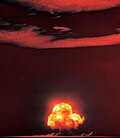Wikipedia:Today's featured article/requests/Manhattan Project
Appearance
Manhattan Project
[edit]This nomination predates the introduction in April 2014 of article-specific subpages for nominations and has been created from the edit history of Wikipedia:Today's featured article/requests.
- This is the archived discussion of the TFAR nomination for the article below. Subsequent comments should be made on the appropriate discussion page (such as Wikipedia talk:Today's featured article/requests). Please do not modify this page.
The result was: scheduled for Wikipedia:Today's featured article/July 16, 2013 by BencherliteTalk 18:24, 2 July 2013 (UTC)
The Manhattan Project was a research and development project that produced the first atomic bombs during World War II. It was led by the United States with the support of the United Kingdom and Canada. From 1942 to 1946, the project was under the direction of Major General Leslie Groves of the US Army Corps of Engineers. It began modestly in 1939, but grew to employ more than 130,000 people and cost nearly US$2 billion (about $34 billion in 2025 dollars). Although it operated under a tight blanket of security, it was penetrated by Soviet atomic spies. The first device ever detonated was an implosion-type nuclear weapon in the Trinity test, conducted at New Mexico's Alamogordo Bombing and Gunnery Range on 16 July 1945 (pictured). Project personnel participated in the Alsos Mission in Europe, and in the bombing of Hiroshima and Nagasaki. After the war the Manhattan Project conducted weapons testing in Operation Crossroads, developed new weapons, established the network of national laboratories, supported medical research into radiology and laid the foundations for a nuclear navy. It was replaced by the Atomic Energy Commssion and the Armed Forces Special Weapons Project in 1947.(Full article...)
2 points for FA more than 2 years ago, 1 point for date relevance, --Gerda Arendt (talk) 22:50, 22 June 2013 (UTC)
- Support, high quality article. Encyclopedic and educational. Also, SCIENCE!!! — Cirt (talk) 01:03, 23 June 2013 (UTC)
- I know two years is along time, especially on the Internet, but why no save this for 16 July 2015, the 70th anniversary, instead of featuring it in a random year? HJ Mitchell | Penny for your thoughts? 12:29, 27 June 2013 (UTC)
- Support--ColonelHenry (talk) 15:42, 30 June 2013 (UTC)
- Support. Good topic for front-page coverage Praemonitus (talk) 16:43, 30 June 2013 (UTC)
- Hold—I agree with HJ above. This is like running the article on Abraham Lincoln on the 198th anniversary of his birth, instead of holding the article for the bicentennial. Two years may seem long online, but since we ordinarily don't re-run articles, I'd prefer to wait. Imzadi 1979 → 18:09, 30 June 2013 (UTC)
- Wait if the article author concurs. Ed [talk] [majestic titan] 18:26, 30 June 2013 (UTC)
- Comment I did not nominate the article for TFA. I am currently engaged in upgrading the Manhattan Project articles to a featured topic.So articles will be moving through FAC at a rate of one a month for the next 18 months or so. They will include Trinity (nuclear test) though, which might have a better claim on the 16 July 2015 date. Hawkeye7 (talk) 01:04, 1 July 2013 (UTC)
- Support Much like Hawkeye7, I'd prefer to see something more specific like the Trinity test for the 2015 anniversary.--Sturmvogel 66 (talk) 01:35, 1 July 2013 (UTC)

